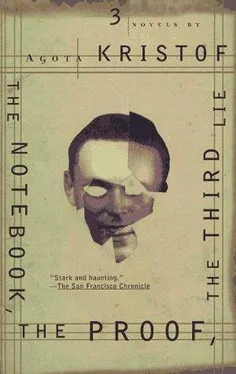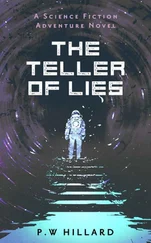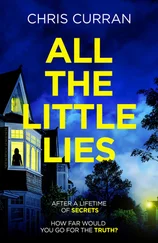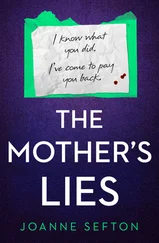I quietly open the door to Mother's bedroom. She is asleep. She's so small you'd think she was a child. I brush the gray hair off her face, kiss her on the forehead, and stroke her wrinkled hands on the bed cover. She smiles in her sleep, squeezes my hand, and murmurs, "My little one. There you are."
Then she says the name of my brother: "Lucas, my little Lucas."
I leave the room, get a bottle of strong alcohol from the kitchen, and settle in the study to write, as I do every night. This study used to be our father's; I haven't changed anything, not the old typewriter, not the uncomfortable wooden chair, not the lamp, not the pencil holder. I try to write but I can only cry and think about the thing that has ruined all of our lives.
Lucas will come tomorrow. I know it's him. I knew it was him from the very first ring. My telephone almost never rings. I had it installed for Mother, in case of emergencies, to order in when I don't have the strength to go to the market or when her condition doesn't allow me to leave.
Lucas will come tomorrow. How to make sure that Mother doesn't find out? That she doesn't wake up during Lucas's visit? Get her out of here? Escape? Where? How? What excuse to give Mother? We've never left here. Mother doesn't want to leave. She thinks it's the only place where Lucas could find us again when he comes.
And it is in fact here that he has found us.
If it's really him.
It's really him.
I don't need any proof. I know. I knew, I have always known, that he wasn't dead, that he would come back.
But why now? Why this late? Why after an absence of fifty years?
I have to protect myself. I have to protect Mother. I don't want Lucas to destroy our peace, our routine, our happiness. I do not want our lives turned upside down. Neither Mother nor I could bear Lucas starting to root around in our past, reviving memories, asking Mother questions.
At all costs I must fend off Lucas, keep him from reopening that terrible wound.
It is winter. I must save coal. I take the edge off the cold in Mother's room with an electric heater that I turn on an hour before she goes to bed and turn off when she has fallen asleep, then turn on again an hour before she wakes up.
As far as I'm concerned, the heat of the kitchen stove and a bit of coal for the living room stove are enough. I wake up early to light the kitchen stove, and once it has produced enough embers I take some into the living room stove. I add a few lumps of coal and in half an hour it's warm in there too.
Late at night, when Mother is already asleep, I open the study door and the heat from the living room immediately flows in. It's a small room and warms up quickly. It is there that I change into my pajamas and bathrobe before starting to write. That way, after I have finished writing all I have to do is go to my room and climb into bed.
Tonight I pace around the house. I stop several times in the kitchen. Then I go into the children's room. I look at the garden. The bare branches of the walnut tree brush against the window. A fine snow settles in thin, frosted layers on the branches and on the ground.
I walk from one room into the other. I've already opened the study door; it is there that I will see my brother. I will close the door as soon as my brother comes, the cold be damned; I do not want Mother to hear us or for our conversation to wake her.
What will I say if that happens?
I will say, "Go back to bed, Mother, it's only a journalist."
And to the other one, to my brother, I will say, "It's only my mother-in-law, Antonia. She's been living at our house for a few years, ever since she was widowed. She's not completely right in the head. She confuses everything, gets things mixed up. She sometimes thinks that she's my real mother because she raised me."
I must keep them from seeing each other or they will recognize each other. Mother will recognize Lucas. And if Lucas doesn't recognize Mother, she will say when she recognizes him, "Lucas, my son!"
I want no "Lucas, my son!" Not anymore. It would be too easy.
Today, while Mother was taking her nap, I moved all the watches and clocks in the house forward by an hour. Luckily night falls early this time of year. It's already dark at five in the afternoon.
I make Mother's dinner an hour early. Carrot puree with potatoes, meatloaf, and crème caramel for dessert.
I set the kitchen table and go call Mother from her room. She comes into the kitchen and says, "I'm not hungry yet."
I say, "You're never hungry, Mother. But you have to eat."
She says, "I'll eat later."
I say, "Later everything will be cold."
She says, "All you have to do is reheat it. Or maybe I won't eat at all."
'I'll make you some herbal tea to whet your appetite."
Into her tea I dissolve one of the sleeping pills she usually takes. I put another next to her cup.
Ten minutes later Mother falls asleep in front of the television. I pick her up, carry her to her room, undress her, and put her to bed.
I go back into the living room. I turn down the television and mute its screen. I reset the hands on the alarm clock in the kitchen and on the living room clock.
I still have time to eat before my brother arrives. In the kitchen I have a bit of carrot puree and meatloaf. Mother has difficulty chewing despite the dentures I had made for her not too long ago. Her digestion isn't very good either.
When I've finished eating I do the dishes and put the leftovers in the refrigerator; there's just enough for tomorrow's lunch.
I settle down in the living room. I put two glasses and a bottle of brandy out on the little table next to my armchair. I drink and wait. At eight o'clock on the dot I check on Mother. She's sleeping deeply. The detective movie begins and I try to watch it. Around eight-twenty I give up on the movie and take up a post by the kitchen window. The light inside is off and it's impossible to see me from outside.
At eight-thirty exactly a big black car pulls up in front of the house and parks on the sidewalk. A man gets out, walks up to the gate, and rings.
I return to the living room and say into the intercom, "Come in. The door is open."
I turn on the veranda light, sit back down in my armchair, and my brother comes in. He is thin and pale and walks toward me with a limp; a portfolio case is tucked under his arm. Tears come into my eyes, and I rise and stretch out my hand to him. "Welcome."
He says, "I won't disturb you for long. A car is waiting for me."
I say, "Come into my study. It will be quieter in there."
I leave the television sound on. If Mother wakes up she will hear the detective show, as is usual every night.
My brother asks, "You're not switching off the television?"
"No. Why? We cannot hear it in the study."
I take the bottle and the two glasses. I sit down behind my desk and motion to a chair across from me.
"Have a seat."
I pick up the bottle.
"A glass?"
"Yes."
We drink. My brother says, "This was our father's study. Nothing has changed. I remember the lamp, the typewriter, the furniture, the chairs."
I smile. "What else do you remember?"
"Everything. The veranda and the living room. I know where the kitchen is, the children's room, the parents' room."
I say, 'That is not so difficult. All these houses are modeled on the same pattern."
He goes on: "There was a walnut tree outside the window of the children's room. Its branches touched the glass, and a swing hung from it. With two seats. We kept our scooters and tricycles in the shed at the back of the courtyard."
I say, 'There are still toys there, but not the same ones. These ones belong to my grandchildren."
We are silent. I refill the glasses. When he sets his down Lucas asks, "Tell me, Klaus, where are our parents?"
Читать дальше






![Джеффри Дивер - Where the Evidence Lies [A Lincoln Rhyme Short Story]](/books/403782/dzheffri-diver-where-the-evidence-lies-a-lincoln-r-thumb.webp)





